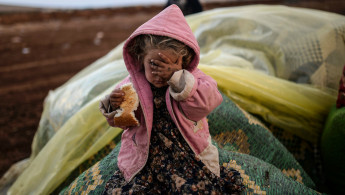Syria Weekly: Coronavirus reaps further miseries on Syrians
The first case was reportedly a 20-year-old woman who had travelled to Syria from the UK via Beirut, contrasting with earlier reports from activists who claimed outbreaks in Syria via Iranian officers and Tehran-backed fighters deployed to the country.
Official figures noted nine cases by Sunday, with the regime taking widespread measures to tackle the outbreak that medical experts have warned could devastate the country.
Markets, public transport, and shops have largely closed and on Wednesday this was expanded to include a nationwide night-time curfew, imposed from 6pm to 6am.
"The curfew is serious, and any violator will be detained and face legal measures," Interior Minister Mohammed Al-Rahmoun warned on Wednesday.
Curfew
Syrian state news reported that 153 people were detained for breaking the curfew on the first night and 345 more on Thursday evening.
Schools have been suspended until at least mid-April, while intra-city public transport was also banned on the weekend.
To ease the spread of the virus in jails, the Syrian regime last week announced that some prisoners would be released, although not political detainees.
Reserve officers who have completed three years commissions and reserve soldiers who have served in the army for seven will be demobilised, the military command said on Sunday.
Despite the measures, health professionals have warned that Syria is ill-prepared to deal with a major outbreak.
|
|
"Although at the time of publishing this memo there have only been five confirmed cases of COVID-19 in Syria, several indicators suggest that the virus is already significantly more widely spread across the country," the report states.
Omar Abu Layla, director of monitoring site DeirEzzor24, said that there have been several reported cases of the disease among Iranian militias that control the regime-controlled western side of the Euphrates River, including the cities of Al-Mayadeen and Albukamal.
"The people in Deir az-Zour are in a state of fear and know that the Iranian militias are the ones who brought it there, especially as they are moving with ease between Iran, Iraq and Syria."
"This is considered good but not enough. It is feared that these crossings will be reopened and will threaten the region as movement between the two banks of the Euphrates may transfer the virus," Abu Layla said.
In the SDF autonomous areas, the medical community is said to be ill-equipped to deal with an outbreak and has no COVID-19 test kits, Abu Layla added.
Read also: Coronavirus could kill 100,000 Syrians in Idlib's refugee camps
SAM Development organisation has reached 100,000 civilians in Al-Suheil and distributed more than 2,500 leaflets to encourage people to stay at home.
People across Deir az-Zour fear the Assad regime is downplaying the number of cases to avoid any "meddling" in Syria by the international community, something that the Assad regime will likely see as a threat to its rule.
"It is a frightening state to live in, because of the war and existing cells, so that means there has been a significant impact on the economy caused by the virus."
Syria's fragile economy is already showing worrying signs of damage due to the curfew measures, including the halting of movement with neighbouring Lebanon, which has been an important source of hard currency and goods.
Staples such as bread and vegetables in Syria are in short supply and hit by inflation, while the Syrian lira dropped to a new low of over 1,300 pounds to the dollar.
Many shops and public offices have closed, schools and universities suspended, and major public and cultural events cancelled, while parliamentary elections have been pushed back to 20 May.
|
|
A protracted suspension of ordinary life in Syria will see business hit, government revenues shrink, and further pressure on ordinary Syrians, Dareen Khalifa, senior Syria analyst at the International Crisis Group told The New Arab.
"Ministries were instructed to reduce the effective workforce by 40 percent of normal staffing without affecting the delivery of services and announced a complete closure of the border to Lebanon," Khalifa said.
"The deteriorating economic conditions have led to parallel networks in Damascus to become more extractive and corruption levels to increase. COVID-19 is likely to exacerbate this," Khalifa added.
Syria Weekly is a regular feature from The New Arab. To get Syria Weekly in your inbox each week, sign up here
Paul McLoughlin is a news editor at The New Arab.
Follow him on Twitter: @PaullMcLoughlin



